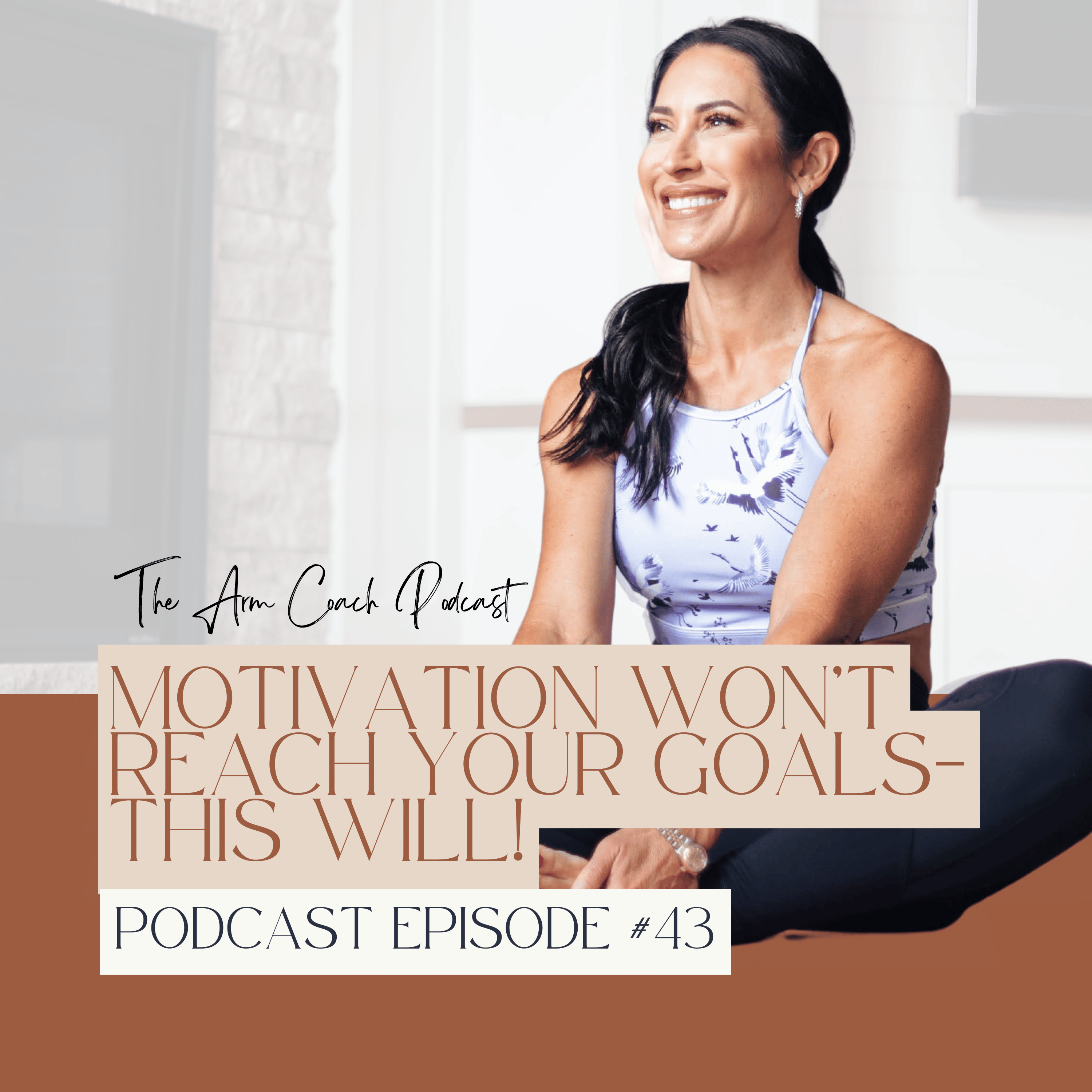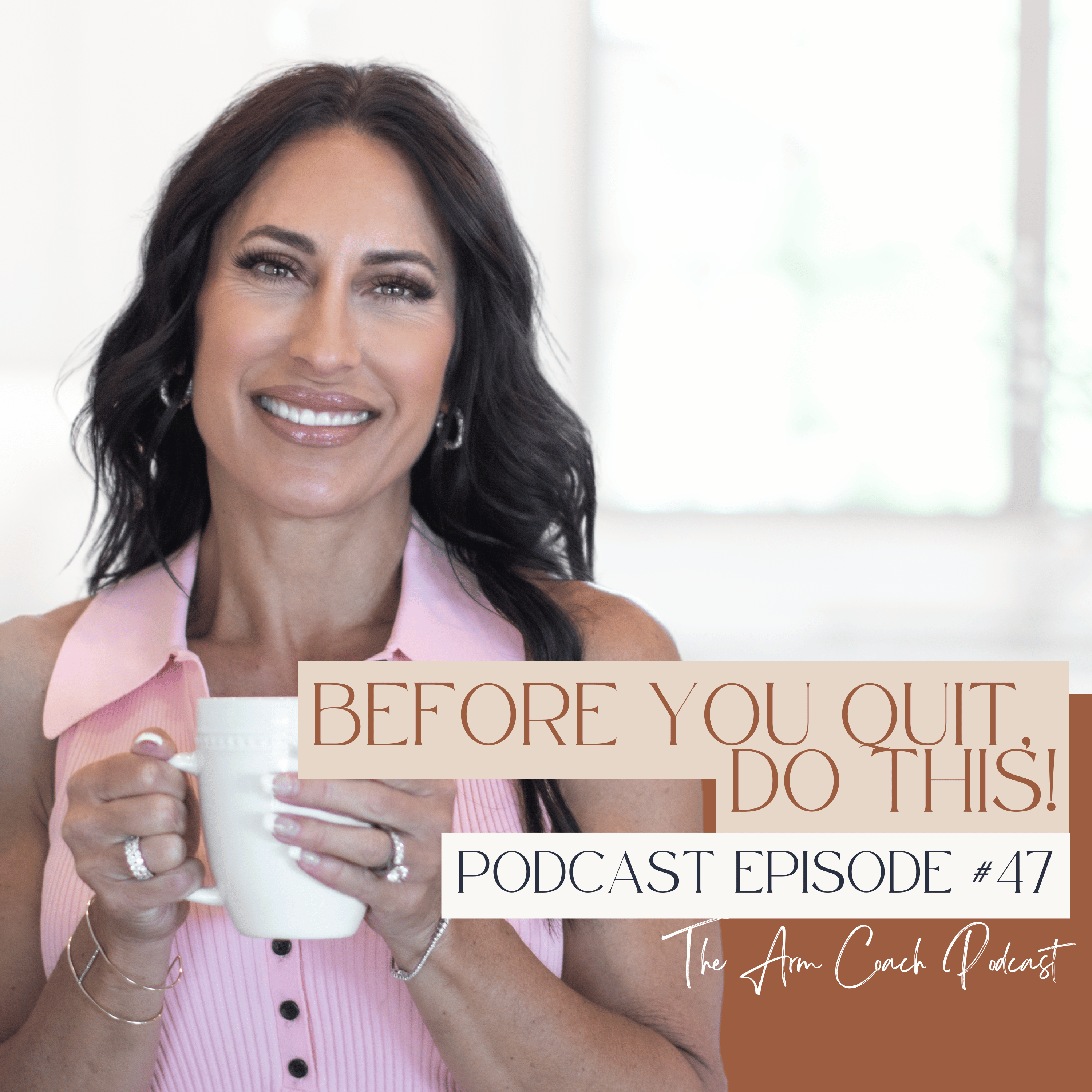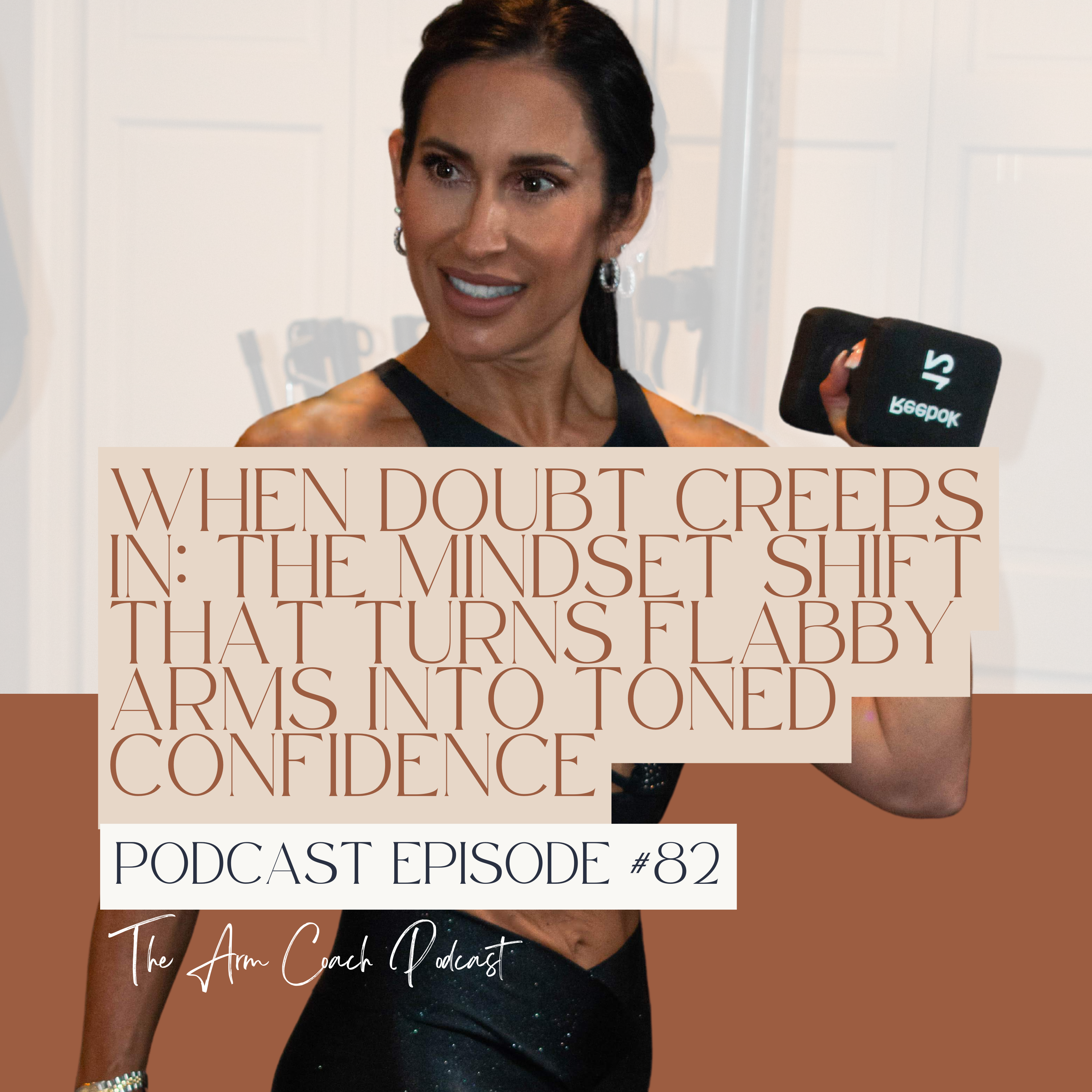Hi, everybody, and welcome to The Arm Coach podcast, episode
#10.
Today we're going to talk all about exercise and eating habits.
What they are, how you create them and how to change them.
I'm your very own arm coach, Kristine Rucker. I'm happy to have
you back, listening again with me. So let's get started.
I want to start with a really big thank you to all my followers who
are listening each week. I am giving you all the topics that I give
my clients, and I hope that you're beginning to see, that no
matter how long you've suffered with your lack of exercise or
your eating habits, there is nothing wrong with you, and to know
that change is always possible. The only time change is not
possible, is if you give up. And giving up, if you're here with me
today, just is not an option for you. So please know that. If you're
enjoying these coaching sessions, please take a few minutes and
invite someone who may be interested into the group. I’m so
grateful for all of you who've done this already.
So let's move now into today's episode. Habits and how they
relate to your arms. We all have habits, but we're not always
aware of what they are. It just seems like we do certain things
automatically. But in order to change our patterns of skipping
workouts or eating, and our patterns of the way we do things, the
first thing we need, of course, is to become aware of what we're
doing. So, what is a habit? Now a habit can be a helpful habit,
like brushing your teeth, or an unhelpful habit like eating when
you feel an emotion. But a habit is just a routine or a behavior. It
also doesn't have to be something you do. It could be the way
that you think. It could be a habitual feeling that you create. And
it's something that you repeat regularly. And it's hard to give up,
because we do it so repeatedly that it becomes a really well worn
pathway in our brain. And it's so automatic that it can feel like it's
happening unconsciously. And that's the reason we want to
create good habits, because they become easy. Once we have a
habit in place, it doesn't require a lot of thought or effort. Once
it's created, again like brushing your teeth, you don't have to
think about it, and make a decision and debate what the right
thing to do is. It just feels like you just do it. So when you're first
creating a habit, you use willpower to get yourself to do
something that's new and something that feels unnatural. But
once it's created and practiced, it will feel totally easy and
comfortable and natural. And that's your goal. That's why, when
you shine the light on what you're doing, even if it's something
that you're doing that's not helpful, it's still so hard to stop.
Because it's become your routine. And the funny thing is, that
we're painfully aware of our results of our habits, but not so much
of the habit itself. Or we may notice what we're doing when we're
doing it, but we may tell ourselves that we feel kind of powerless
and out of control to stop. So I want you to know that all the
actions you take are within your control. But if you've practiced a
way of doing things, then doing them differently is going to be
uncomfortable. So I want you to know that, and expect that until
it becomes a new routine, a new habit, then it will become easy
again. But until it does, it will be uncomfortable. They say that it
takes 21 days to form a new habit, and to stop doing an old one.
Now this may be true for something really simple, like getting
yourself to floss. But to change your exercise and eating
behaviors, is something that's going to take longer. And I want to
be upfront with you about that. And I want you to be realistic with
yourself, because exercise and eating is so tied into your
thoughts and your feelings, and making multiple decisions each
time you go to workout or eat. So it is going to be longer than 21
days, and it is going to be more challenging than getting yourself
to floss. But know that it doesn't matter how long it takes. It
simply doesn't matter. Your exercise and eating habits that you
have become your little rituals, right? There's a queue. And then
there's the behavior what you do. And then there's the rewards
that you get. So let's take an example. You go to the movies, and
you automatically buy a large popcorn or buttered popcorn. And
then you eat it while you're watching the movie. You don't even
have to think about what you're doing. You don't make a decision
about each bite you take. You just do it automatically, because
that's your habit. It tastes good. So the part of your brain that's
wired for rewards is satisfied, and that part of your brain urges
you to keep going. And the movie ends, and you look down at
that empty carton of popcorn. And you can't believe it's gone
because you didn't even notice yourself doing it. And that is your
movie eating habit.
Or here's another one. You have a long day at work. So you
come home and you automatically plop on the couch, pick up
your phone and order a pizza. Your thought, what leads up to
that, is your thought of course. Your thought is, I'm too tired to
cook. And your feeling might be something like giving in,
defeated. So the action that you take, is you sit on the couch and
order the pizza. And the result you have, is maybe less energy,
less motivation and not as great of health, if you do it all the time,
some extra weight on your arms. That whole thing put together is
your after work no exercise and eating habit. Or let's say you
decide, you know it would really be good for you if you took your
lunch to work a few days a week. But on the weekend, you're in
the habit of just vegging out totally. Not grocery shopping, not
having food available. So on Monday morning, there's nothing in
the house and you end up in your old habit of grabbing a burger
for lunch. You don't like your habit, and you don't like the results
it gives you, but you feel powerless. Now here's a thinking habit.
You have a friendship, an exercise or walking partner, and maybe
she’s moving away, and you feel a real natural loss. But on top of
that natural expected pain, you're thinking something like, I can't
handle this. So that extra optional thought creates a feeling of
panic or fear, and maybe your habit is that you skip exercise or
turn to tv or food to feel better. Your result is extra weight, but
you don't know how to stop the cycle. And you may do this for
the slightest emotional changes that you feel when you feel afraid
of something, or worried about something, or lonely or angry, or
even happy. Many people skip workouts or eat emotionally, even
when there's good things happening in their life, because they've
just developed the habit of skipping workouts or eating when
they feel a strong emotion, even if it's positive. Now you may
have created these emotional habits where the cue is that you
feel that strong emotion. And then you run from it. That's the
habit. In our life, we're going to have many experiences and
many thoughts about those experiences. And then, of course,
we'll have many feelings. But if we always distract ourselves or
eat to dim the feeling, then we're always going to be struggling
with our bodies. So think about what your exercise or eating
habits are. Think about when you do them. And make a list of
them. What do you do? When do you do it? And exactly what do
you do, what are the steps you take? Now, let's back up a little
bit and think about what this habit is costing you. In the moment,
of course you think it's worthwhile. But when you're peaceful,
you can see that no amount of distraction or delicious food is
worth the pain that you're causing yourself. So the goal is that
you want to feel good when you think about doing what your
habit is, you want to feel good while you're doing your habit, and
you want to feel good after it's done. So in the moment, if you
say to yourself, as you're upset and you're staring down a piece
of cake, ‘Do I really want this?’, it's not a good question, because
of course, in that moment, your answer is going to be yes. But
how will you feel when you're done eating it? It's not about the
food, it's about managing those feelings without the food. So, if
you've identified a negative exercise or eating habit, let's get
clear on its cost to you. What are the ways you pay for doing it? I
want you to list them and get really, really clear with yourself. Of
course, yes, you will have extra weight if your habit is eating past
hunger, or flab on your arms if you don’t lift weights. You're also
going to have some damage to your self esteem. Your clothes
won't fit. Your whole self image changes. And what happens
then, is that bleeds into other parts of your life. You begin to think
of yourself as less than intelligent. Less than competent, which is
not true. But that's what happens when that habit will bleed into
the rest of your life. So it's not just exercise and eating. And think
about what are the ways that you would benefit from stopping
this habit and adding a new habit. You would feel proud. You'd
feel stronger. You'd feel more confident and that too would do
the exact same thing that a negative habit would do, which is it
would bleed into the other areas of your life, but in a really good
way. So, to start this plan of dropping a bad habit, I want you to
pick just one. Now, you either can pick the easiest, that will give
you the quickest results, and then move on to something harder,
because you'll improve your confidence, right? Or you could
choose the biggest, most painful habit first. And here's why you
might choose to do that. If you choose the biggest habit first, and
you stick with it, then you're going to get the biggest reward, the
biggest relief, the biggest improvement. And that will motivate
you to keep going and give you confidence that you could do
this. There’s no right way to do it. It's whichever way feels best to
you. The most important thing is that you're starting.
I want you to think of the urges to do your skipping exercise and
eating habits as loops in your brain. Notice them. Notice, and
know that they're just signals from your brain to keep you safe
unnecessarily. They have no real meaning, and they're definitely
not in the best interest of you. Of the real you. The you that wants
the best for yourself. And then you will just dismiss them. And
here's how. I want you to think about what I call the step
laddering exercise. Think of your habit, maybe you head right to
the cookies when you're tired or upset. I want you to list all the
steps you take when you do your eating habit. So, something
happens in your world, and you think something about it. You
create feelings that are upsetting to you. You walk into the
kitchen and then you take the food that your body doesn't need
at that moment. You take it out of the fridge, or out of the
cabinets. You open the food. You may sit down, or maybe you
just stand. And you start eating. You finish one cookie. You reach
for another and another and another. Those are the steps of your
habit. What I want you to know, is that even if you are already
started on doing your routine, this pattern, this habit, you can
stop at any time. Imagine that you're on a ladder, and each rung
of the ladder is a different action. At any point in this habit, you
can stop, and make a U turn. It is never too late. Now the harmful
co-habit here, is when you say to yourself, ‘well I've already
started, I may as well keep going. I'll just start fresh tomorrow.’. If
you eliminate that sentence from your mind, and what I mean by
that is simply, notice it and stop responding to it. It's not an
order. It's just an old habitual thought in your mind that you've
already started, you may as well keep going. So if you stop
responding to that sentence in your mind, you can stop at any
time on that ladder of thoughts. And then each time going
forward, you'll be able to stop sooner. Until you catch yourself
before you begin. And that habit will no longer have power over
you. So if you
get the urge to do laundry when you scheduled your workout or
eat something that isn't helpful to you, then picture yourself
about to start climbing that step ladder of steps to your habit.
You don't have to go there. And you could stop at any moment
and climb down. And every time you stop sooner is a victory.
And once you experience the thrill of knowing that you're in
control of yourself, the next time will get easier and easier. So
what's hard to do while you're making these habit changes, will
become easy to do. And while you're doing it, and it's
challenging, that doesn't mean it's bad. Hard does not mean
bad. And hard, in this case, is very temporary. You can do this.
Pick the one thing that you'll work on and let me know how
you're doing. Do not let yourself go into overwhelm about how
many habits you have that you want to change. It doesn't matter.
All that matters is that you're becoming more and more aware of
what's working for you, and what's not. So just pick one thing,
and focus on that one thing.
That's all for today on this topic, but habits are a really big
subject so we're going to return to this many times. And I want to
hear about your progress, and I want to hear your questions. My
email is
[email protected] so send me a message.
See I’ll you all next week!


